The Growing Automotive Industry In North America
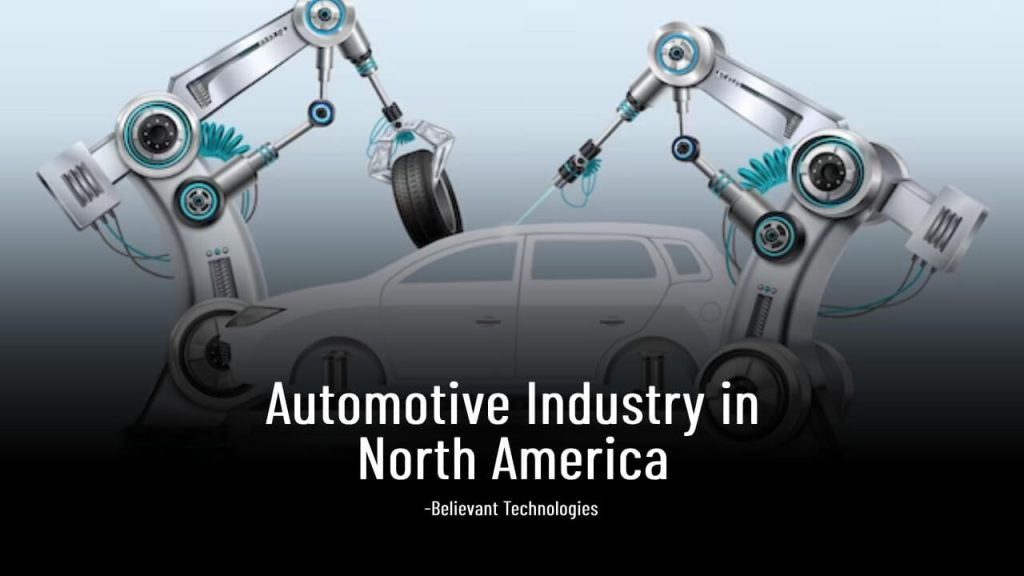
The Automotive Industry in North America stands as a cornerstone of the nation’s economy, driving innovation, employment, and technological advancements. With a rich history dating back over a century, the automotive sector has played a pivotal role in shaping American culture and mobility.
The North America automotive industry encompasses a diverse array of manufacturers, suppliers, and stakeholders, contributing significantly to both domestic and global markets.
From iconic American brands to foreign automakers with manufacturing plants on American soil, the industry is characterized by its dynamism and competitiveness.
As one of the world’s largest automotive industry, north America boasts a robust ecosystem of research and development, manufacturing facilities, and consumer demand.
With a focus on innovation and sustainability, the industry is witnessing transformative shifts towards electric vehicles (EVs), autonomous driving technology, and connected mobility solutions.
In this blog, we delve into the intricacies of the Automotive Industry in North America, exploring its historical significance, current landscape, key players, market trends, and future outlook.
From Detroit’s Motor City to Silicon Valley’s tech hubs, we uncover the driving forces behind America’s automotive prowess and examine the factors shaping its trajectory in the global marketplace. Join us as we navigate through the dynamic and ever-evolving world of automotive innovation in the USA.
History of the Automotive Industry in USA
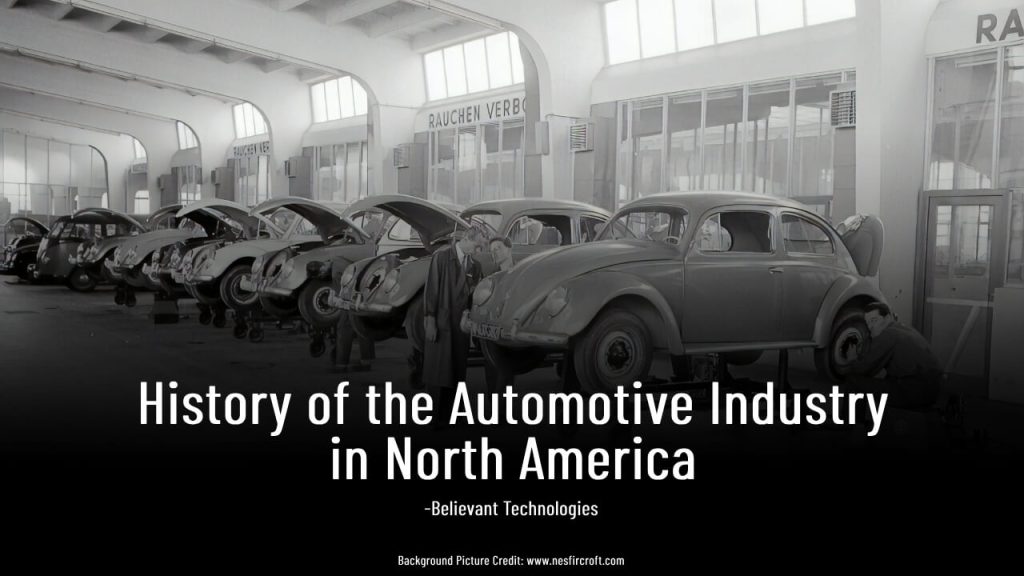
The history of the Automotive Industry in North America is a tale of innovation, entrepreneurship, and technological advancement. Dating back to the late 19th century, the USA emerged as a global leader in automobile manufacturing, laying the foundation for a vibrant and dynamic industry that would shape the nation’s economy and culture.
At the turn of the 20th century, visionaries such as Henry Ford, Ransom Olds, and William C. Durant revolutionized the automotive landscape with the introduction of mass production techniques and assembly line manufacturing.
Ford’s Model T, introduced in 1908, became a symbol of America’s industrial prowess, making automobile ownership accessible to the masses and transforming transportation on a global scale.
Rise of The American Automotive
The rise of the American automotive industry was fueled by a spirit of innovation and competition, with iconic brands such as General Motors, Chrysler, and Ford dominating the market.
From the golden age of the 1950s, characterized by sleek designs and powerful V8 engines, to the challenges of the oil crisis in the 1970s and the resurgence of American muscle cars in the 1980s and beyond, the industry has weathered numerous highs and lows.
Throughout its history, the Automotive Industry in the USA has been marked by landmark achievements, including the development of safety innovations, environmental regulations, and technological breakthroughs.
From the introduction of catalytic converters and airbags to the advent of electric vehicles and autonomous driving technology, American automakers have continually pushed the boundaries of what’s possible.
Today, the Automotive Industry in the USA remains at the forefront of innovation, driving forward advancements in mobility, sustainability, and connectivity.
As the industry continues to evolve in the 21st century, its rich history serves as a testament to the ingenuity and resilience of the American spirit. Join us as we explore the past, present, and future of the Automotive Industry in the USA.
Current Scenario of the Automotive Industry in USA
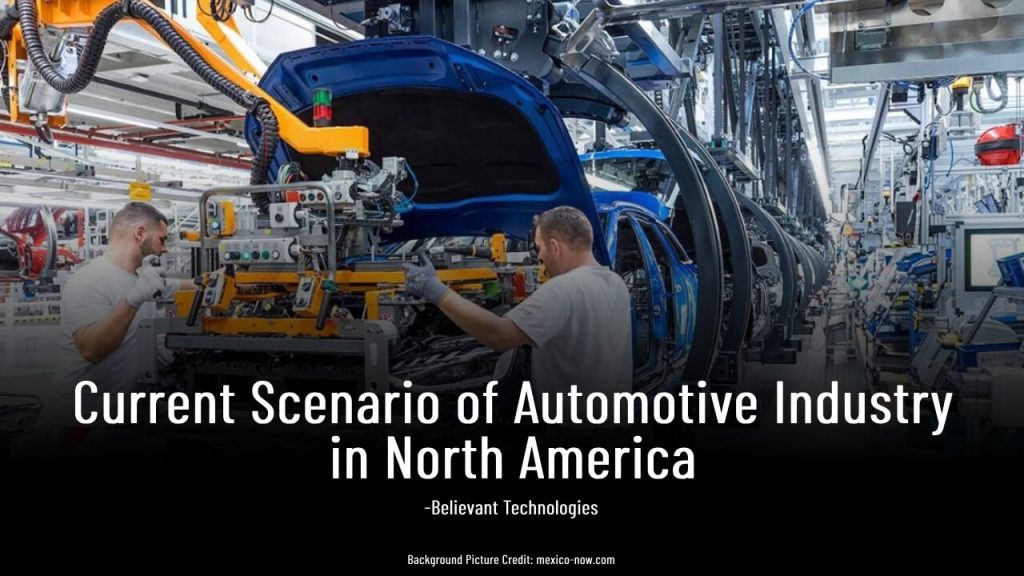
The Automotive Industry in the USA is experiencing a period of rapid transformation, marked by technological innovation, shifting consumer preferences, and evolving market dynamics. As the world moves towards a future of electric and autonomous mobility, American automakers are navigating a landscape defined by both challenges and opportunities.
One of the key trends shaping the current scenario in the USA automotive industry is the rise of electric vehicles (EVs). With advancements in battery technology and growing environmental concerns, EVs have gained traction among consumers seeking sustainable transportation solutions.
Major automakers like Tesla, General Motors, and Ford are investing heavily in electric mobility, with ambitious plans to electrify their vehicle lineups in the coming years.
In addition to electrification, the automotive industry in the USA is witnessing a surge in autonomous driving technology. Companies like Waymo, Uber, and Cruise are developing self-driving vehicles with the potential to revolutionize transportation and mobility services.
While regulatory hurdles and safety concerns remain, the promise of autonomous vehicles holds the potential to improve road safety, reduce traffic congestion, and enhance mobility access for all.
Impact of COVID-19 on Industry
Furthermore, the COVID-19 pandemic has had a profound impact on the automotive industry, disrupting supply chains, production schedules, and consumer demand. Despite initial setbacks, the industry has shown resilience, with automakers adapting to new challenges and embracing digital transformation.
Remote work arrangements, online vehicle sales, and contactless service options have become increasingly common, reflecting a shift towards a more digitized and customer-centric approach.
As the automotive industry in the USA continues to navigate these transformative changes, collaboration and innovation are key to staying competitive in a rapidly evolving landscape.
From investing in electric and autonomous technology to prioritizing sustainability and resilience, American automakers are charting a course towards a future of mobility that is safer, cleaner, and more connected than ever before.
Fuel-Based Vehicle Market
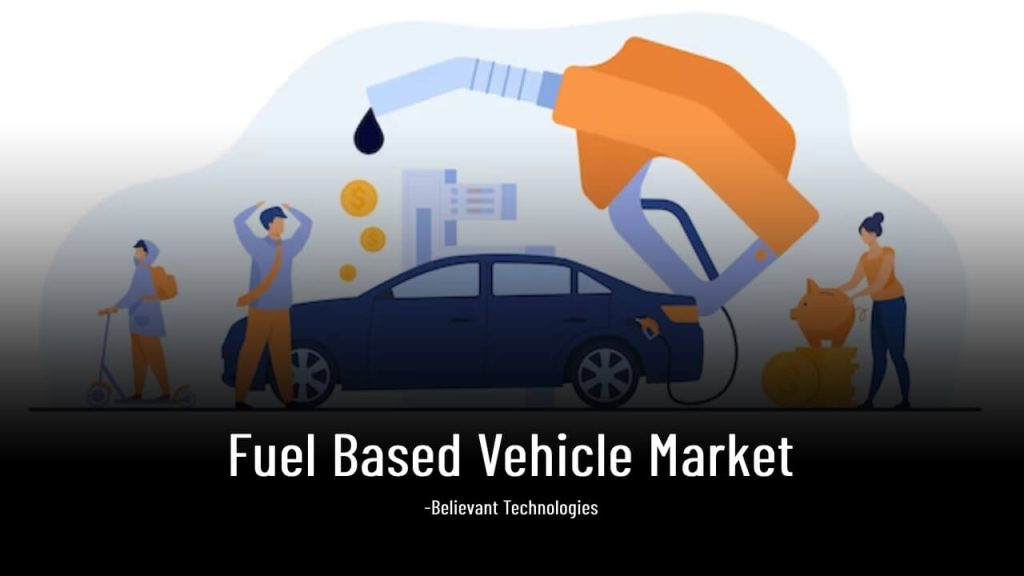
While the automotive industry in the USA is witnessing a shift towards electric and autonomous vehicles, fuel-based vehicles continue to play a significant role in the market. Despite the growing popularity of electric vehicles (EVs), traditional gasoline-powered and diesel vehicles remain a staple choice for millions of American consumers.
One of the primary drivers of the fuel-based vehicle market in the USA is the widespread availability of gasoline and diesel fuel infrastructure. With a vast network of gas stations spanning the country, consumers have convenient access to refuelling options for their vehicles, making gasoline and diesel-powered cars a practical choice for many.
Another factor contributing to the resilience of the fuel-based vehicle market is the affordability and familiarity of internal combustion engine (ICE) technology. While EVs offer environmental benefits and lower operating costs in the long run, fuel-based vehicles often have a lower upfront cost and may be perceived as more reliable by some consumers.
Improvement In Fuel-Based Vehicles
Additionally, fuel-based vehicles continue to evolve in terms of fuel efficiency and emissions standards. Automakers are continuously improving the efficiency of gasoline and diesel engines, incorporating advanced technologies such as turbocharging, direct injection, and hybridization to enhance performance while reducing fuel consumption and emissions.
Despite these factors, the fuel-based vehicle market in the USA is not without its challenges. Concerns over air pollution, greenhouse gas emissions, and dependence on fossil fuels have prompted calls for stricter environmental regulations and incentives to accelerate the adoption of cleaner alternatives.
Furthermore, the emergence of electric vehicles as viable alternatives to traditional fuel-based cars poses a competitive threat to the long-term viability of the fuel-based vehicle market.
With advancements in battery technology, charging infrastructure, and government incentives, EVs are gaining momentum and capturing an increasing share of the market.
EV Vehicle Market
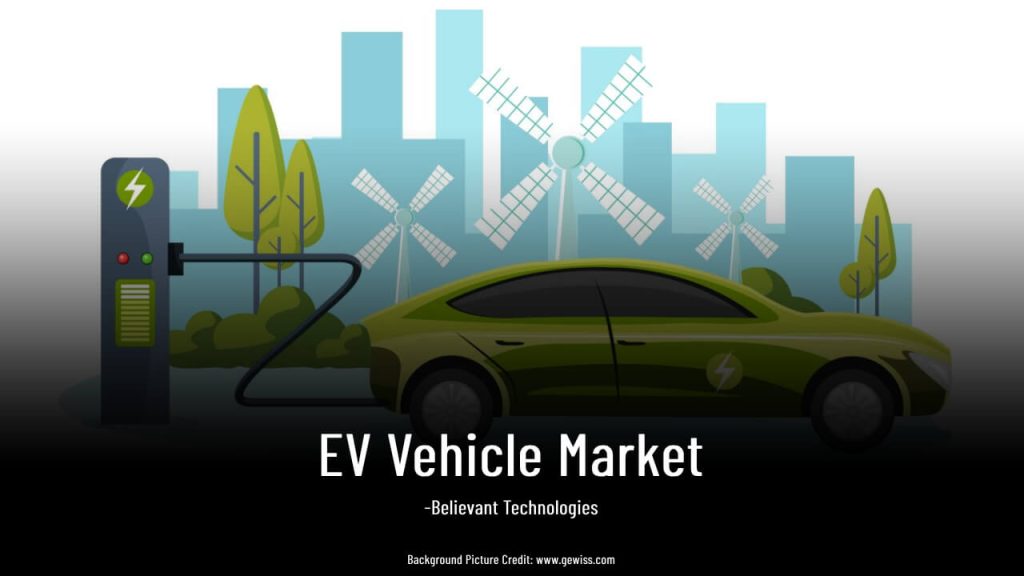
The Electric vehicle (EV) market in the USA is experiencing unprecedented growth and momentum, driven by technological advancements, environmental concerns, and government incentives.
As the world transitions towards sustainable transportation solutions, EVs are emerging as a key driver of innovation and disruption in the automotive industry.
One of the primary factors fueling the growth of the EV market in the USA is the increasing awareness and concern about environmental sustainability.
With growing concerns over air pollution, climate change, and reliance on fossil fuels, consumers are seeking cleaner and greener alternatives to traditional gasoline and diesel vehicles.
Additionally, advancements in battery technology, charging infrastructure, and electric drivetrains have made EVs more accessible and practical for everyday use. With longer-range capabilities, faster charging times, and a growing network of charging stations across the country, EVs offer a compelling alternative to conventional vehicles.
Adoption of EVs in The USA
Government support and incentives have also played a crucial role in driving the adoption of EVs in the USA. Federal tax credits, state rebates, and incentives for electric vehicle purchases have helped offset the higher upfront costs of EVs and incentivize consumers to make the switch to electric.
Furthermore, major automakers are ramping up their investments in electric mobility, with plans to electrify their vehicle lineups and introduce new EV models in the coming years.
From electric sedans and SUVs to electric trucks and commercial vehicles, the EV market in the USA is witnessing a diverse range of offerings to meet the varying needs of consumers.
Despite these advancements, challenges remain for the EV market in the USA. Concerns over charging infrastructure availability, range anxiety, and battery degradation continue to impact consumer confidence in EVs.
Additionally, the higher upfront cost of EVs compared to traditional vehicles remains a barrier to widespread adoption.
Automobile Engineering Contribution in North USA for Automotive Industry
The North USA region, encompassing states such as Michigan, Ohio, and Indiana, has long been at the forefront of automotive engineering and innovation. With a rich history dating back to the early days of the automotive industry, this region has played a pivotal role in shaping the development and advancement of automobiles.
One of the key contributions of automobile engineering in North USA is the establishment of major automotive manufacturing hubs.
Cities like Detroit, known as the “Motor City,” have been home to iconic automakers such as Ford, General Motors, and Chrysler, driving the mass production of automobiles and propelling the USA to become a global leader in automotive manufacturing.
Furthermore, North USA has been a hotbed of research and development in automotive engineering, with leading universities and research institutions collaborating with industry partners to drive innovation.
From pioneering safety technologies to developing cutting-edge propulsion systems, the region’s automotive engineers have made significant contributions to the advancement of automotive technology.
Design studios Of USA
In addition to manufacturing and R&D, North USA has been a hub for automotive design and styling. Design studios based in cities like Detroit and Dearborn have been responsible for creating some of the most iconic and influential vehicle designs in automotive history.
From classic muscle cars to modern SUVs and electric vehicles, the region’s design talent has left an indelible mark on the automotive landscape.
Moreover, the North USA region has been at the forefront of automotive testing and validation. With extensive proving grounds and test tracks, automotive engineers in the region conduct rigorous testing to ensure the safety, performance, and durability of vehicles under various conditions.
This commitment to quality and reliability has helped solidify the USA’s reputation as a leader in automotive engineering.
As the automotive industry evolves, North USA remains a vital hub for innovation and advancement. With a legacy of excellence and a commitment to pushing the boundaries of automotive engineering, the region is poised to play a leading role in shaping the future of mobility in the USA and beyond.
Now let’s look at what India contributes to the automotive industry.
India’s Contribution to Automotive Industry
India has emerged as a significant player in the global automotive industry, with a rich history of innovation, manufacturing prowess, and technological advancement. From indigenous design and engineering capabilities to a robust manufacturing base, India’s contribution to the automotive sector is diverse and multifaceted.
Manufacturing Hub
India is renowned as a major manufacturing hub for automobiles, with a wide range of domestic and international automakers establishing production facilities across the country. From passenger cars and commercial vehicles to two-wheelers and three-wheelers, India’s manufacturing capabilities span the entire automotive spectrum.
Design and Engineering
Indian automotive engineers and designers have made significant contributions to vehicle design, engineering, and development. Several Indian automotive companies and design studios have gained recognition for their innovative designs, advanced engineering solutions, and cost-effective manufacturing techniques.
Research and Development:
India’s automotive industry is supported by a strong ecosystem of research and development (R&D) institutions, academic centres, and technology incubators. These institutions collaborate with industry partners to drive innovation, develop new technologies, and address the evolving needs of the automotive sector.
Affordable Mobility Solutions
India is known for its prowess in frugal engineering, where automakers develop cost-effective solutions without compromising on quality or performance. This focus on affordability has led to the development of innovative vehicle platforms, fuel-efficient engines, and value-for-money vehicles that cater to the diverse needs of Indian consumers and export markets.
Electric Mobility
With a growing emphasis on sustainability and environmental conservation, India is increasingly focusing on electric mobility solutions. The government has implemented various initiatives and incentives to promote electric vehicles (EVs), leading to increased investment in EV manufacturing, battery technology, and charging infrastructure.
Global Export Hub
India has emerged as a global export hub for automotive components and vehicles, supplying products to global markets. Indian manufacturers leverage the country’s skilled workforce, competitive manufacturing costs, and strategic location to export a wide range of automotive products to international markets.
Talent Pool
India boasts a large pool of skilled engineers, technicians, and automotive professionals who contribute to the industry’s growth and innovation. The country’s strong educational institutions produce graduates with expertise in various fields of automotive engineering, providing a steady stream of talent to support the industry’s needs.
Let’s wrap up with something that help you out!
As we end our investigation into the automobile industry, it is clear that North America and India play critical roles in promoting innovation, manufacturing excellence, and technical improvement in this dynamic sector.
From North America’s historic roots in the automotive industry, characterized by pioneering innovations and iconic brands, to India’s emerging automotive powerhouse, marked by indigenous design capabilities and manufacturing prowess, each region brings distinct strengths and contributions to the table.
At Believant Technologies, we understand the necessity of embracing these global viewpoints and leveraging both areas’ total knowledge to provide cutting-edge solutions to our clients globally.
With a complete portfolio of services encompassing automotive design, engineering, and production, we are dedicated to meeting the changing needs of the automotive industry and propelling innovation.
As we look ahead, the possibilities for collaboration, innovation, and growth in the automobile industry are endless. Whether we’re creating the next generation of electric vehicles, refining manufacturing processes for greater efficiency, or pushing the limits of autonomous driving technology, we’re ready to lead the charge toward a brighter, more sustainable future for mobility.
Join us on this adventure as we work to change the future of the automotive industry, one invention at a time.
Let’s work together to drive innovation. Contact us today to understand how Believant Technologies can help you realize your automotive vision.
